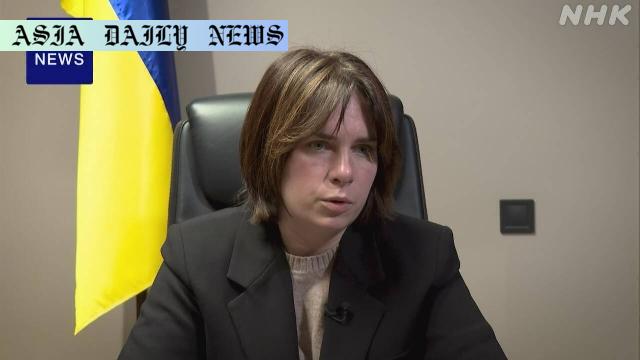Crimea: Kuryshko asserts Crimea must return to Ukraine, condemns cultural destruction, and warns of Russia’s systematic aggression.
Crimea must be returned to Ukraine according to Kuryshko.
Russia accused of ousting indigenous people from Crimea.
Destruction of Crimea’s UNESCO heritage site condemned.
Ukrainian officials express concern over U.S. approach to the conflict.

Ukraine’s Unwavering Stance on Crimea
Ukraine’s resolve to reclaim Crimea remains firm, as emphasized by Olha Kuryshko, the Permanent Representative of the President of Ukraine in the Autonomous Republic of Crimea. Over the past 11 years, since Russia’s unilateral annexation of Crimea in 2014, the region has been a focal point of geopolitical tension. Speaking to NHK from Kyiv, Kuryshko reiterated Ukraine’s commitment to recovering the peninsula, stating that “Crimea must return to Ukraine, and there will be no territorial concessions.” Her words reflect the country’s ongoing defiance against deepening Russian control of the region, despite international complexities and competing interests.
The People of Crimea and Their Struggles
Kuryshko expressed confidence that the people of Crimea desire liberation from Russian occupation. She argued that Russia’s policies have created a stifling and oppressive environment for the peninsula’s inhabitants, particularly the indigenous communities. According to her, these policies aim to systematically oust native populations, rewiring the cultural fabric of the region for their own geopolitical purposes. Moreover, the destruction of UNESCO-registered ancient ruins in Crimea only underscores the extent to which Russian occupation has altered the area’s rich historical and cultural legacy. These deliberate acts of cultural vandalism not only erase the heritage of the region but also stand as a stark reminder of the broader implications of annexation.
Global Politics and U.S. Stance on Crimea
Amid these growing concerns, Kuryshko voiced apprehension about the United States’ evolving position. She expressed her disapproval of comments made by former U.S. President Donald Trump, who suggested that Ukraine’s aspiration to recover its pre-2014 territories might be unrealistic. These statements have sparked anxiety among Ukrainian officials, leading Kuryshko to question whether the U.S. and its allies remain committed to the principles of international law that denounce territorial annexations. Kuryshko highlighted the importance of holding Russia accountable for its actions, including addressing what she described as “crimes” that have occurred during the occupation. Such remarks underline her belief that a strong, united international front remains critical to realizing Ukraine’s territorial ambitions.
The Road Ahead
Ukraine’s demands go beyond words; they are built on a foundation of international justice, historical sovereignty, and fairness. While the nation calls for diplomatic resolution and alignment from global allies, there is a deep awareness that reclaiming Crimea will not be an easy path. International mediation efforts, sanctions, and heightened political dialogue must act in tandem to counterbalance Russia’s footing in the region. At the same time, efforts to document and raise global awareness about the atrocities committed in Crimea add urgency to their claims. For Ukraine, the annexation of Crimea is not just a regional issue but a robust example of placing national sovereignty at the center of international relations.
As the Crimea conflict enters its twelfth year, Ukraine’s determination continues to resonate, even amidst strong geopolitical challenges. Kuryshko’s statements not only reflect the resilience of her country but also serve as a call to action for the global community to remember Crimea — not as a frozen conflict, but as a critical issue waiting for justice. The narrative surrounding Crimea is, essentially, a story about sovereignty, the endurance of a people, and the unyielding fight for a rightful return.
Commentary
Context of the Crimea Dispute
The situation in Crimea is a poignant reminder of the enduring complexities in international relations. The 2014 annexation initiated one of the most contentious territorial disputes in modern history, raising questions about sovereignty, international law, and the role of global actors in ensuring justice. From Ukraine’s perspective, the territory is not only a vital part of its national integrity but also a region tied to its cultural and historical identity. Russia’s actions stand in contrast, seemingly aimed at reshaping the demographics and historical narrative of Crimea to justify its geopolitical ambitions.
The Struggles for Sovereignty
Ukrainian officials, like Olha Kuryshko, amplify the struggles faced by the indigenous populations in Crimea under systemic policies designed to marginalize them. These efforts to undermine cultural identities illustrate the harsh realities of annexation, often ignored amidst broader political disputes. Moreover, the deliberate destruction of historical landmarks amplifies the gravity of Russia’s control over the peninsula. It is evident that fostering awareness about these issues is vital in rallying international support and rekindling interest among global powers in addressing the plight of the Crimean people.
Global Implications and the U.S. Stance
The concerns around statements by global leaders, like former U.S. President Donald Trump, shed light on the shifting sands of international diplomacy. Ukraine’s apprehensions about waning support from its Western allies raise broader questions about global priorities. Sovereign disputes like Crimea require consistent, principled stances from powerful nations. Wavering narratives or political expediency could jeopardize the integrity of an already tenuous international order, making it essential for influential countries to reaffirm their commitment to addressing and resolving such disputes.
A Call for International Unity
Ensuring the return of Crimea to Ukraine is far from a regional issue—it represents the very foundation of how the world navigates issues of sovereignty and justice. The call for liberation and restoration is not only a Ukrainian cause but a collective global responsibility. For any resolution to arise, solidarity among nations, adherence to international law, and a firm stance against cultural destruction are non-negotiable. The resilience and hope demonstrated by Ukraine in the face of such adversity serve as an inspiring reminder of the yearning for justice and freedom that binds humanity across national borders.


